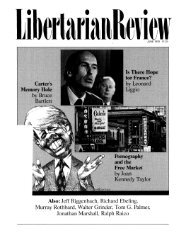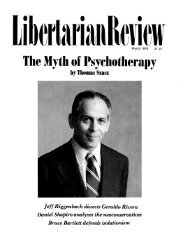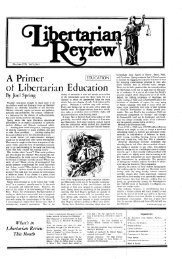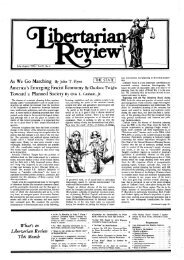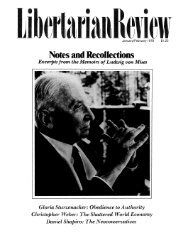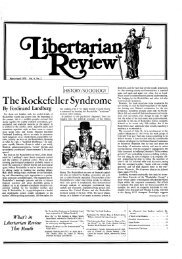The Libertarian Review July 1978 - Libertarianism.org
The Libertarian Review July 1978 - Libertarianism.org
The Libertarian Review July 1978 - Libertarianism.org
You also want an ePaper? Increase the reach of your titles
YUMPU automatically turns print PDFs into web optimized ePapers that Google loves.
a SO percent increase since the late 1960s in the proportionof freshmen failing a standard English placement test. Andwhen the Association of American Publishers recentlyissued a pamphlet designed to help college freshmen readtheir textbooks more efficiently, they were forced to reviseit for its second printing and adjust its readability to ninthgrade level. It seems the original twelfth grade level texthad been too difficult for most college freshmen.<strong>The</strong> reading and figuring required by the business worldare proving too difficult for most of those high schoolgraduates who do not go on to college. One Bank ofAmerica executive frankly laments (in a U. S. News andWorld Report article) the paucity of applicants-many ofwhom do hold four-year college degrees-who can spelland punctuate, much less compose intelligible memos andreports. <strong>The</strong> Wall Street Journal recently led an article onthe competency movement with an anecdote about atypical high school graduate in Gary, Indiana who can'tkeep a secretarial job because of her poor reading comprehension."<strong>The</strong>re seems to be little correlation," Charles Silbermanwrites, "between people's performance on the job andeither the amount of education they have had or the marksthey have received." And according to John Holt, peopleare gradually awakening to this fact. "Almost nothing inexperience," Holt writes in Freedom and Beyond (1972),"supports the widely held idea that by looking at what aperson has done in school we can tell what he will be ableto do outside of school. People understood this once betterthan they do now. To be good at school meant only thatyou were good in school, a scholar, Le., a 'schooler.' Itsuggested that you might do well to spend the rest of yourlife in schools or places like school. Today people seem toassume that being good in school, being able to rememberwhat the teacher or the book says, being able to guess whatthe teacher wants and to give it to him, means that in lifeyou will be good at almost everything.<strong>The</strong> facts are, however, that these versatile "schoolers"who promise to be "good at almost everything" are littlebetter than anyone else at the real tasks of life. And if theyhappen to be black or brown, the practical consequence ofall their schooling may be as little as $S a week more insalary than a school dropout doing the same work. In suchsituations, we are, it seems to me, entitled to ask, as PaulGoodman asked over a decade ago: "Is this worth the painfuleffort of years of schooling that is intrinsically worthlessand spirit-breaking?"Intrinsically worthless? "If one looks at what actuallygoes on in the classroom," Silberman writes, "the kinds oftexts students read and the kind of homework they areassigned, as well as the nature of classroom discussion andthe kinds of tests teachers give-he will discover that thegreat bulk of students' time is ... devoted to detail, mostof it trivial, much of it factually incorrect, and almost all ofit unrelated to ... anything other than the lesson plan."Studying the American Revolution, Silberman found inthree years of studying public elementary schools "means,of course, memorizing names, dates, places, 'cause' of theRevolution, and so on-a mass of unrelated data." Study-ing literature means summarizing the plots and listing anddescribing the major characters and events in tediousperiod pieces like Ge<strong>org</strong>e Eliot's Silas Marner, whilediscouraging any genuine artistic interest a student may expressin fiction-especially in the fiction of his own time."Much of what is taught is not worth knowing as a child,let alone as an adult," Silberman concludes, "and little willbe remembered. <strong>The</strong> banality and triviality of the curriculumin most schools has to be experienced to bebelieved."But consider: Does it really take 12 years of schooling,six hours a day, five days a week, 30 or more weeks peryear, to teach a child to read Basic English and balance hischeckbook? <strong>The</strong>se are the goals of the competency movementand, effectively, the skills tested by the various highschool equivalency exams used around the country to certifydropouts who possess the knowledge and skills of highschool graduates. As John Holt has pointed out, almost allstates and territories which employ these tests will administerthem only to applicants whose classes have alreadygraduated. That is, they make sure the tests are notavailable to students who might use them to prove theircompetence and drop out of school "early." But if they arecompetent, why keep them in school? Goodman saw thereason, and identified it in so many words: to break theirspirits.Social controlIt should, in fact, come as little surprise to the militantminority of American parents which regards the publicschools with horror that so little meaningful learning goeson within their walls. It has always been this way, more orless. From the beginning, the American public school hasbeen an educational institution only secondarily if at all. Ithas always been primarily an institution of social control.It was in 1862, Murray Rothbard tells us in his "Education,Free and Compulsory," that "Massachusetts establishedthe first comprehensive, statewide, modern systemof compulsory schooling in the United States." But by thenit had been a long time coming. <strong>The</strong> first compulsorypublic schools of any kind on the North American continenthad been founded two hundred years before, in thesame place. In 1647, the theocratic state known as theMassachusetts Bay Colony established public schools forthe explicit purpose of inculcating Calvinist-Puritan principlesin the children of the Colony, that they might growup to be devout citizens. And within a century all NewEngland but Rhode Island had imitated Massachusetts's example.After the Revolutionary War, it was again Massachusettswhere vigilance first awakened to the possibility ofdisloyalty and wrong thinking. Just as schools had beennecessary to inculcate the theocratic values of Colonialsociety, so schools would now be necessary to inculcatethe republican values of the new ruling class. A Bostonbasedgroup of Federalist merchants and lawyers called the"Essex Junta" campaigned in the 1780s for an extensivepublic school system to teach the young "proper subor-22<strong>Libertarian</strong> <strong>Review</strong>



